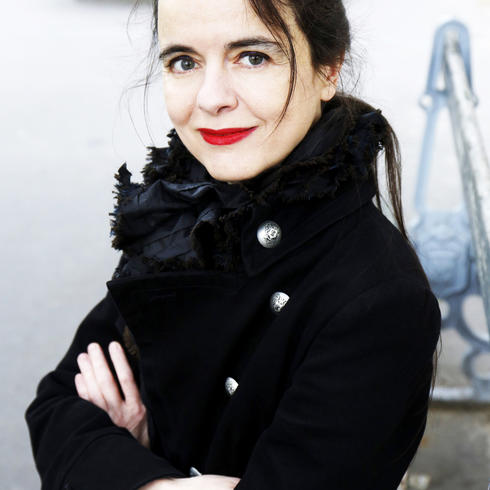
" For all of her work "
- Nominated for : The Literary Prize 2015


© Olivier Dion


Novel
Editions Albin Michel
Born in Kobe, Japan, in 1967, Amelie Nothomb spent her childhood and teenage years in the Far East. She arrived in Europe "in pain" at the age of 17. After studying ancient philology in Belgium, she returned to Japan where she worked as an interpreter. She now lives between Brussels and Paris. It is writing, she said, which allowed her to survive.
Gifted writer, Amelie Nothomb acquires success at the age of 25 with Hygiène de l'assassin (1992), a perverse cruel novel which features a face to face with no mercy, a Nobel Prize of literature misanthropic and misogynistic, and three journalists who came to interview her on hearing the news of her coming death. Already, the writer uses, what will become her personal touch, common to all her work: black humor, fantasy, severity and theatricality. Excelling in the writing of dialogues, her first two novels Hygiène de l'assassin and Sabotage amoureux (1993) will be skillfully adapted to the theater. In 1994, she made the leap and wrote her first play: Les combustibles
Les catilinaires (1995) shows that the characters panic before the unexpected while Peplum (1996), a novel to the unbridled imagination, comes in the form of a dialogue between a mad scientist of the future, a leading specialist in ancient Rome, the narrator whose crazy assumption has led him to anticipate a reality that scientistsof the future are responsible for the eruption of Vesuvius in 79 AD!
Back to black humour with Attentat (1997) where, with a candor and ferocious childlike cruelty, Amélie Nothomb depicts a kind of Elephant Man and leads him to the crime of passion. The look of the other is still explored in Mercure (1998) or, more accurately, the theme of "reflection": the image and that of thought.
"A direct writing, a cruel tone and devastating humor is her trademark. And each of her novels explore masochism and sadism of these lives that are full of feelings. Exister à tout prix." (ML Delorme, literary magazine, November 1999) exist at any price, it is the key word in Stupeur et tremblements (1999, Grand Prize of the novel of the French Academy). The writer describes the Japanese society through the company where she tries to work despite humiliation. Through this tragic human comedy, painful farewell to the land of her childhood, the writer advocates salutory disobedience.
Métaphysique des tubes (2000) also proposes a first-person narrative: her autobiography from birth to 3 years! Playing with the absurd takes a tangible reality in her writing, Amélie Nothomb offers an apology for voluptuousness and opposes pleasure to death. But beneath the humor the poetry of horror pierces through, that is the true style of the writer and, no doubt, her vision of the world that we find in the Cosmétique de l'ennemie (2001) where she celebrates the tenth anniversary of a murder committed twice ten years apart!
Relation to the body is also a pervasive theme in her books, suffering bodies, pathological, ugly, fat, skinny, tortured bodies as in Robert des noms propres (2002) where, for the love of dancing, the girl agrees to break her body while her mother encourages her to lose weight until self-destruction. The ugly opposed to the beautiful in a duel of humiliation in sometimes delicious in Antéchrista (2003). And still the hunger of a novelist who has experienced dizziness of anorexia, this hunger that devours and is described in Biographie de le fame (2004): "Suraffamée, I am more than anyone. (...) I was hungry for Nishio-san, my sister and my mother. I was hungry for gaze of my father... "
Acide Sulfurique (2005), the novelist tackles reality TV. An unemployed person, becomes the Kapo Zdena, falls in love with a student of stunning beauty, a prisoner of the televised concentration camp. The good and the evil as fatal couple, the victim and the executioner, the beauty and the beast aswell.
In Journal d'hirondelle (2006), Amélie Nothomb returns to the figure of the assassin: Following an unhappy love affair, a man loses all ability to feel the slightest emotion. He leaves his job as a courier to become a hired killer. Killing for him is the only way to exist, a real pleasure. But while he is charged with murdering a minister and his family, he comes across the diary of the girl he has just killed. Reading it will forever change his destiny.
With Ni d'Eve ni d'Adam Eve (Albin Michel, Prix de Flore 2007), Amélie Nothomb comes back to the land of the rising sun, to tell of her love affair with a very strange young man, with her best wit and delicious modesty delicious with a touch of irony.
"Everything can be found in this romance between the East and West: the recipe for the okonomiyaki and secrets of the fabrication of Belgian beers, amazing painting of Mount Fuji and the hilarious description of manners in the Land of the Rising Sun, the analysis of the ruthless Japanese education system and the extraordinary dignity of the people of Hiroshima, the passion without return of this poor Rinri and the birth of a novelist to freedom pegged to her heart." (Marianne Payot, L'Express, 30/08/2007)